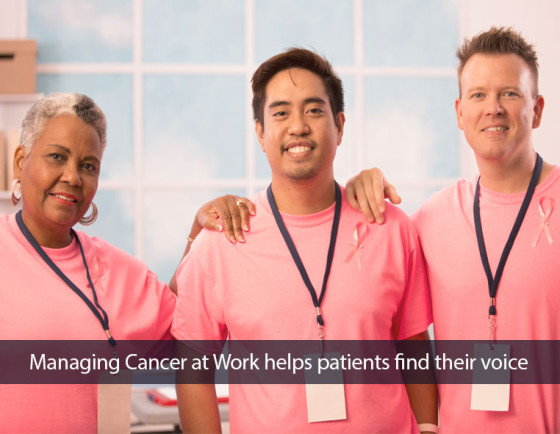Managing Cancer at Work helps cancer patients find their voice


Managing Cancer at Work celebrates its one-year anniversary of helping cancer patients ask for, and find support, at work.
SUPPORTING CANCER PATIENTS AND THEIR FAMILIES
First piloted at Pitney-Bowes in January 2015, Johns Hopkins’ Managing Cancer at Work™, marks its one-year anniversary as a program uniquely designed to support employees dealing with a cancer diagnosis or supporting someone with the disease.
All too often, it is easy to feel alone while battling a disease that can dramatically affect your physical and mental well-being. And while family members can offer care and support, getting that same level of assistance on the job can be difficult. But finding support on the job is critical. The American Cancer Society estimates that 1 in 2 men and 1 in 3 women will face a cancer diagnosis in their lifetimes. Many of those same individuals will be of working age when their diagnosis occurs. These employees want and need to stay on the job.
As an oncology nurse navigator for Managing Cancer at Work™, Marie Borsellino knows that opening the lines of communication can help ease the burdens shared by both employee and employer alike. “Once the employee opens the dialogue, they put everyone at ease,” Borsellino says. “Because of HIPAA and privacy, a supervisor may not even ask the employee what’s going on, and that has a chilling effect as it leads the employee to think Does anyone even care? Cancer sometimes is something you can’t hide. One day you walk in with hair, the next day you don’t. How can you ignore that? So we talk about what is safe and what is not to promote a successful workplace experience.”
Managing Cancer at Work™ is a three part program, focused on education, advocacy and navigation. The program materials feature real-life stories and role-playing videos to help employees tell supervisors and co-workers about their diagnosis. There is a wealth of knowledge about common cancers, treatment options, hospital policies and health insurance choices. Additionally, managers are able to find information on how to best respond to employees who have been diagnosed with cancer and how to manage work accommodations.
The program aims to help employees and their supervisors reach an understanding with each other about working with a cancer diagnosis. For Marie Borsellino, what’s most important is bringing order to what can be a fluid, chaotic situation.
“I truly believe in what we’re doing,” Borsellino says. “The goal is to get people back to work, back to normalcy. It’s been a privilege to be part of this.”
Click here to learn more about the benefits of Managing Cancer at Work™.
